|
|
|
Sort Order |
|
|
|
Items / Page
|
|
|
|
|
|
|
| Srl | Item |
| 1 |
ID:
091631
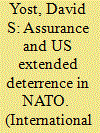

|
|
|
|
|
| Publication |
2009.
|
| Summary/Abstract |
Historically the NATO allies have focused considerable attention on US 'extended deterrence'- that is, the extension by Washington of an umbrella of protection, sometimes called a 'nuclear guarantee'. A persisting requirement has been to provide the allies with assurance about the reliability and credibility of this protection. This article examines the definition of 'assurance' used by the US Department of Defense for most of the past decade and argues that it has drawn attention to long-standing policy challenges associated with US extended deterrence in NATO. The article considers the assurance roles of US nuclear forces in Europe, as well as elements of assurance in Washington's relations with its allies regarding extended nuclear deterrence. Whether the allies will retain the current requirements of extended deterrence and assurance in their new Strategic Concept or devise a new approach will be an issue of capital importance in the policy review launched at the Strasbourg/Kehl Summit. Contrasting approaches to these questions are visible in the United States and Germany, among other allies. The main issues to be resolved include reconciling extended deterrence with arms control priorities; managing the divisions in public and expert opinion; and avoiding certain potential consequences of a rupture with established arrangements.
|
|
|
|
|
|
|
|
|
|
|
|
|
|
|
|
| 2 |
ID:
177068
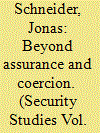

|
|
|
|
|
| Summary/Abstract |
This article examines the proliferation-inhibiting effect of US alliances. Existing explanations for nuclear reversals of US allies have focused either on the assurance that alliances provide or on US threats of abandonment. However, neither model can account for the fact that allied leaders disagreed over the reversal decision. Also, whether an ally agreed to or rejected nuclear restraint depended on which policymakers carried the day as much as on external factors. To explain why some policymakers accept and others refuse nuclear reversal, I draw on a psychological aspect of US alliances: the social pressure inherent in demands by the United States as an ally holding a superior international status. New evidence from Germany and South Korea shows only policymakers who acknowledge this higher rank of the United States, and hence view their own nation as inferior, respond to this social pressure by obeying the US demand for a nuclear reversal.
|
|
|
|
|
|
|
|
|
|
|
|
|
|
|
|
| 3 |
ID:
190843
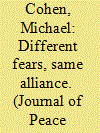

|
|
|
|
|
| Summary/Abstract |
How do power, interests and threats influence the creation of military alliances? Under what conditions do multilateral and bilateral alliances emerge? Are shared threat perceptions necessary for alliance creation? This article addresses these longstanding questions through developing and refining theories of alliance creation and design and tests them using new archival data from Australia and the United States. The theory and empirics refine balance of threat theory through developing and/or testing other theories regarding the balance of power, threat perception, assurance, signalling and control. Empirically, the article shows that although after the 1950 Korean War the United States wanted Japan to be capable of withstanding Soviet and Chinese challenges, Australia, New Zealand and the Philippines feared that this would allow future Japanese naval militarism. Truman sought to secure regional buy-in to his Japanese settlement through one multilateral alliance, given bilateralism’s costs of assuring multiple allies, but had to settle for several bilateral alliances given regional refusal to ally with Japan. The findings show that bilateral alliances incur previously neglected ‘assurance costs’ and that alliances are possible between states with divergent threat perceptions.
|
|
|
|
|
|
|
|
|
|
|
|
|
|
|
|
| 4 |
ID:
143017
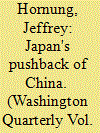

|
|
|
|
|
| Summary/Abstract |
Bilateral relations between China and Japan are in a state of disrepair.1 The current nadir began on September 7, 2010, when the Chinese fishing trawler Minjinyu 5179 collided into two Japan Coast Guard vessels in waters near the Japanese-administered Senkaku Islands (Pinnacle Islands in English). Following the arrest of the captain, Beijing cancelled meetings and cultural exchanges, demanded apologies as well as compensation for holding him, and repeatedly summoned Japan's ambassador. Beijing even restrained Japan-bound rare-earths’ exports and subjected many Japanese imports to lengthy customs inspections. Subsequent events sunk ties to new lows, including Tokyo's September 2012 purchase of three of the Senkaku Islands from their private Japanese owners and Beijing's November 2013 declaration of an expansive Air Defense Identification Zone (ADIZ) that overlaps considerably with Japan's (including the Senkakus). Peppered in-between have been derisive statements by officials, for example when their ambassadors to the United Kingdom compared each other's country to Lord Voldemort, the antagonist in the Harry Potter series, in dueling January 2014 op-eds in Britain's The Telegraph.
|
|
|
|
|
|
|
|
|
|
|
|
|
|
|
|
| 5 |
ID:
127262
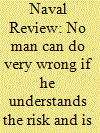

|
|
|
| 6 |
ID:
157900
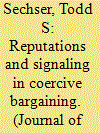

|
|
|
|
|
| Summary/Abstract |
When do states defend their reputations? States sometimes pay high costs to protect their reputations, but other times willingly tarnish them. What accounts for the difference? This article investigates reputation building in the context of coercive diplomacy. In coercive bargaining, giving in to a challenge can harm one’s reputation. I argue, however, that states value their reputations less—and therefore are more willing to capitulate to coercive threats—when they do not expect future challenges. Using a data set of more than 200 coercive threats, empirical tests find support for this logic. Coercers that are constrained in their ability to initiate future challenges exhibit higher rates of coercive success in the status quo. The results shed light on the causes of reputation-building behavior and add an important element to our understanding of the dynamics of coercive diplomacy.
|
|
|
|
|
|
|
|
|
|
|
|
|
|
|
|
| 7 |
ID:
146630
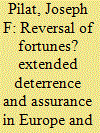

|
|
|
|
|
| Summary/Abstract |
The extended deterrence relationships between the United States and its allies in Europe and East Asia have been critical to regional and global security and stability, as well as to nonproliferation efforts, since the late 1950s. These relationships developed in different regional contexts, and reflect differing cultural, political and military realities in the US allies and their relations with the United States. Although extended deterrence and assurance relations have very different histories, and have to some extent been controversial through the years, there has been a rethinking of these relations in recent years. Many Europeans face a diminished threat situation as well as economic and political pressures on the maintenance of extended deterrence, and are looking at the East Asian relationships, which do not involve forward deployed forces as more attractive than NATO’s risk-and-burden-sharing concepts involving the US nuclear forces deployed in Europe. On the other hand, the East Asian allies are looking favorably at NATO nuclear consultations, and in the case of South Korea, renewed US nuclear deployments (which were ended in 1991), to meet increased security concerns posed by a nuclear North Korea and more assertive China. This paper explores the history of current relationships and the changes that have led the allies to view those of others as more suitable for meeting their current needs.
|
|
|
|
|
|
|
|
|
|
|
|
|
|
|
|
| 8 |
ID:
152376
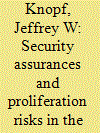

|
|
|
|
|
| Summary/Abstract |
Comments that Donald Trump made while campaigning to be U.S. president have raised concerns that his administration will pull back from U.S. alliance commitments and encourage countries such as Japan and South Korea to acquire nuclear arms. The new article by Frühling and O’Neil outlines an institutional framework that can be helpful in assessing the risks that Trump administration policies will lead to nuclear proliferation. An institutional perspective shows that important elements of U.S. security assurances will continue to function, and this reduces the chances that President Trump’s actions or statements will trigger proliferation by U.S. allies. The greatest risk to global non-proliferation efforts posed by a Trump administration in fact lies elsewhere, in the possibility that President Trump will seek to abrogate the Iran nuclear deal.
|
|
|
|
|
|
|
|
|
|
|
|
|
|
|
|
| 9 |
ID:
113865
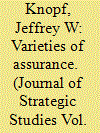

|
|
|
|
|
| Publication |
2012.
|
| Summary/Abstract |
Strategies that seek to assure other states about their security have the potential to reduce international conflict and dissuade states from seeking nuclear weapons. Yet, relative to other tools of statecraft such as deterrence, assurance remains understudied. To facilitate further empirical research on assurance strategies, this article identifies variations in the terminology scholars and policymakers have used to refer to such strategies and describes the concept of assurance associated with each variant. It seeks to clarify and standardize usage and show that there is a general, overarching concept of assurance that links the different variants. It also summarizes existing bodies of empirical research that are relevant to assessing the utility of different forms of assurance.
|
|
|
|
|
|
|
|
|
|
|
|
|
|
|
|
|
|
|
|
|